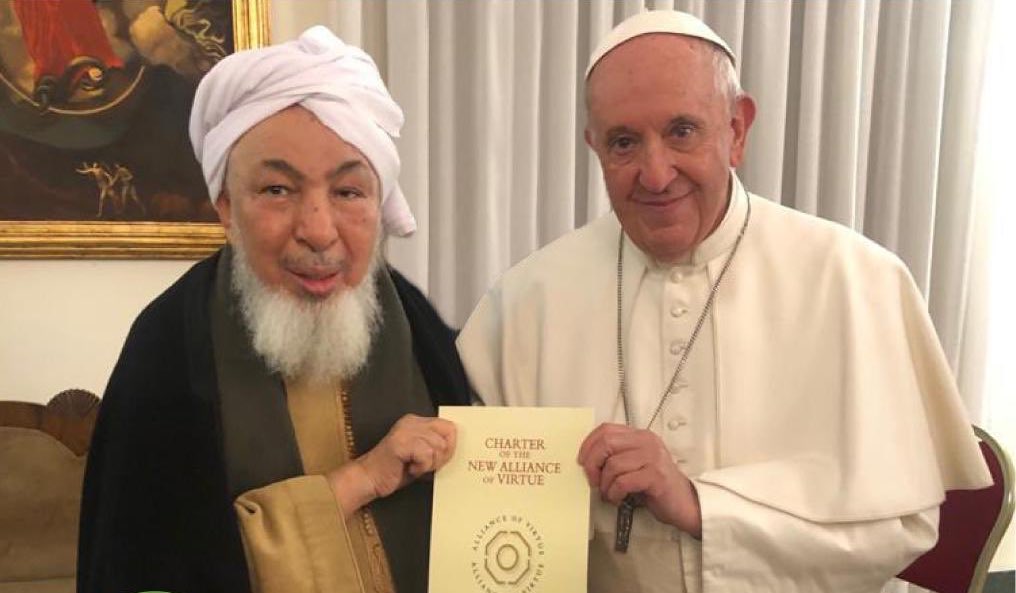The New Alliance of Virtue
By Rev Dr Patrick McInerney
Forum for Promoting Peace in Muslim Societies launches new interfaith charter comparable to the 13th-century Magna Carta in scope and potential influence.
I was privileged to attend the Forum for Promoting Peace in Muslim Societies in Abu Dhabi from 9-11 December 2019. The Forum brought together more than 500 religious and civic leaders from around the world. They were mostly Muslim, but there were also Christian and Jewish leaders from various denominations, and some Buddhist, Hindu and Sikh leaders.
The Forum is an initiative of Sheikh Abdullah bin Bayyah, a distinguished Sunni scholar who is recognised as the world authority in Islamic jurisprudence. He is president of the United Arab Emirates Fatwa Council and an ardent proponent of interfaith relations. The theme of the Forum was “The Role of Religions in Promoting Tolerance: From Possibility to Necessity”.
The highlight of the Forum was the launch of a new international, interfaith charter, the New Alliance of Virtue. It is the culmination of a series of faith and interfaith conferences organised by Sheikh bin Bayyah:
- The January 2016 Marrakesh Declaration came out of a conference of Muslim scholars who established a legal framework from shari’a, or Islamic law, on the rights of religious minorities in Muslim-majority lands based on equal citizenship.
- The December 2018 Washington Declaration turned the focus outwards from Muslim scholars only to leaders from all the Abrahamic Religions. It invited them to make a joint commitment to work for the common good.
- The December 2019 New Alliance of Virtue is a refined version of the Washington Declaration. Like its predecessor, it is framed from the perspective of the Abrahamic religions, but widens the scope even further and reaches out to all peoples. Interfaith experts from all the three religions were consulted. The text has been rigorously edited. The language is precise and magisterial. It is an inspirational document.
The name, “Alliance of Virtue”, derives from an incident in late 7th century pre-Islamic Mecca. A Yemeni merchant who had been defrauded by one of the wealthy Meccan oligarchs appealed to the Meccans for justice. In response, some of the Meccan merchants came together and committed to act collectively that no one among them, whether local or stranger, especially one who had no connections to power, would be treated unjustly. The pact was called the Hilf al-Fudul (“The Alliance of Virtue”). Muhammad ibn Abdallah, who was a young man at the time, witnessed the forging of this alliance, of which the Hashemite tribe to which he belonged was a party. Hadith literature – traditions about the Prophet Muhammad – relate that in his later life, after the call to prophethood:
The Messenger of God, peace and blessings be upon him, said, ‘I witnessed a pact of justice in the house of Abdullah ibn Jud’an that was more beloved to me than a herd of expensive red camels. If I were called to it now in the time of Islam, I would respond’. (Sunan Al-Kubra 12114)
The salient point here is that this Alliance of Virtue was forged in the time before Islam so is not a “Muslim” or “Islamic” agreement as such; but in the hadith quoted above, it is approved and endorsed by the Prophet of Islam such that the values contained in it are binding on Muslims. In other words, the ancient Alliance of Virtue was for non-Muslims and Muslims alike. In a similar way, the New Alliance of Virtue, is for Muslims, for believers in other world religions, and for secular and humanist worldviews. It is all-inclusive.
Rev Robert Sellers, a Baptist Minister from the USA and former chair of the board of the Parliament of the World’s Religions, described the significance of the New Alliance of Virtue as follows:
The charter, which in my view is similar in scope and potential influence to the 13th-century Magna Carta, is grounded upon the principles of ‘human dignity, freedom of conscience and religion or belief, tolerance, justice, peace, mercy, kindness, keeping covenants, and solidarity’. (http://bit.ly/2S4TVVo).
The New Alliance of Virtue merits consideration and implementation by believers from all religions and belief systems in every country. At the Abrahamic Faiths Initiative group, where 25 religious leaders representing millions of Christian, Muslim and Jewish faithful met at the Pontifical Gregorian University in Rome on 14-16 January this year to discuss practical ways of promoting peace and fraternity, Sheikh Bin Bayyah presented a copy of the New Alliance of Virtue to His Holiness, Pope Francis. The Charter complements the Document on Human Fraternity for World Peace and Living Together that was signed in Abu Dhabi one year previously by Pope Francis and Sheikh Ahmed al-Tayeb, the Grand Imam of Al-Azhar University.
I commend the Charter of The New Alliance of Virtue to your prayerful reading and action. I was privileged to endorse the document at its launch at the Forum and invite you to do the same by clicking on the link at https://www.allianceofvirtues.com/english/Charter.asp. I will be promoting the Charter in our interfaith work at the Columban Centre for Christian-Muslim Relations and encourage you also to share it around your personal and professional networks.

